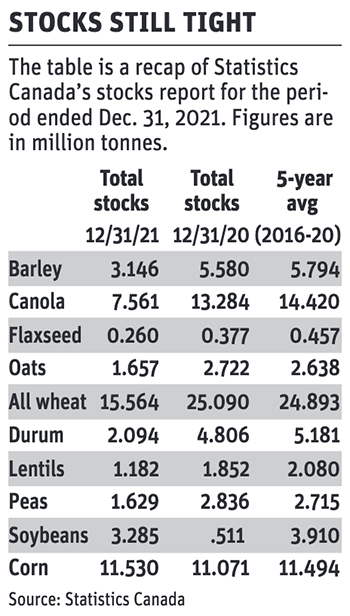Canada’s tight supplies of canola, wheat and other crops following the 2021 prairie drought received more confirmation from Statistics Canada with the release of updated stocks data on Feb. 8.
Canola stocks, as of Dec. 31, of 7.6 million tonnes were down 43 percent from the previous year and the tightest since 2007. Total wheat stocks, at 15.6 million tonnes, were down by 38 percent from the previous year.
“Everybody expected low stocks and we got it,” said MarketsFarm analyst Bruce Burnett.
While the headline numbers for both wheat and canola were down on the year, commercial stocks of the two commodities were actually higher. Burnett noted that end users have been buying aggressively to keep on top of the tight supply situation.
For wheat, supplies in commercial hands of 4.3 million tonnes were up by about 600,000 tonnes from the same point the previous year. Meanwhile, on-farm wheat stocks of only 11.2 million tonnes were down by 47 percent.
The situation was similar in canola, with commercial stocks of 1.9 million tonnes up by 80,000 tonnes from the previous year while on-farm stocks at 5.6 million tonnes were down by 51 percent.
Barley stocks, at 3.1 million tonnes, were down by 44 percent and marked the tightest supplies as of Dec. 31 in records going back to 1980.
While stocks of crops grown in Western Canada were down sharply, growing conditions for corn and soybeans in Eastern Canada was much more favourable in 2021 and corn stocks were actually up on the year.
Canadian corn stocks as of Dec. 31 came in at 11.5 million tonnes, which was up by 4.1 percent from the previous year.

In addition to the solid production, imports of corn for grain hit a record of 1.7 million tonnes during the reporting period, rising 227 percent on the year. The corn imports were tied to the tight feed grains situation in the Prairies, said Statistics Canada.
Soybean stocks were down 6.4 percent on the year, at 3.3 million tonnes. On-farm soybean stocks were up 4.9 percent, at two million tonnes, but were offset by a 19 percent decrease in commercial stocks to 1.3 million tonnes.















